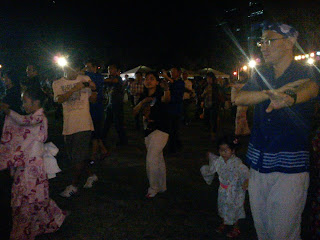Obon (お盆) or just Bon (盆) is a Japanese Buddhist
custom to honor the spirits of one's ancestors. This Buddhist-Confucian
custom has evolved into a family reunion holiday during which people
return to ancestral family places and visit and clean their ancestors'
graves, and when the spirits of ancestors are supposed to revisit the
household altars. It has been celebrated in Japan for more than 500
years and traditionally includes a dance, known as Bon-Odori.
Bon Odori (盆踊り), meaning simply Bon dance is a style of dancing performed during Obon. Originally a Nenbutsu folk dance to welcome the spirits
of the dead, the style of celebration varies in many aspects from
region to region. Each region has a local dance, as well as different
music. The music can be songs specifically pertinent to the spiritual
message of Obon, or local min'yo folk songs. Consequently, the Bon dance will look and sound different from region to region. Hokkaidō is known for a folk-song known as "Soran Bushi." The song "Tokyo Ondo" takes its namesake from the capital of Japan. "Gujo Odori" in Gujō, Gifu prefecture is famous for all night dancing. "Gōshū Ondo" is a folk song from Shiga prefecture. Residents of the Kansai area will recognize the famous "Kawachi ondo." Tokushima in Shikoku is very famous for its "Awa Odori," or "fool's dance," and in the far south, one can hear the "Ohara Bushi" of Kagoshima.
[source: Wikipedia]
Celebrated in the Philippines
There are only a few Japanese schools in this country. One of them is located in Taguig City, where I also live and work. On the start of the summer season (month of March), this festival is held celebrated in that school. I've been attending this occasion since 2009. It was when my brother tagged me along with his Japanese organization in college. He said when it started here in the Philippines, the event was invitational. At first, it was restricted to the Japanese or Filipino-Japanese community, then they opened it to some Filipino community with connection to any Japanese organizations like companies, business stuff, other Japanese organizations.
Affecting Spiritual Context
As a born again christian, I've been wondering about the stand of Japanese christians in this area. I asked one of my Japanese friends on his view about this. He said if there is no worship in your heart in doing this (attending the festival), it's okay. That is his personal stand about this matter. As for me, I have the same opinion. I've been attending the occasion for fun and cultural exposure.
Pictures from Bon Odori 2012
The stalls of food and goodies, mostly filipino traditional products.
The dance from the platform
The dance in the circle, down the platform
After the event, at my favorite part of the school, the clock.





















